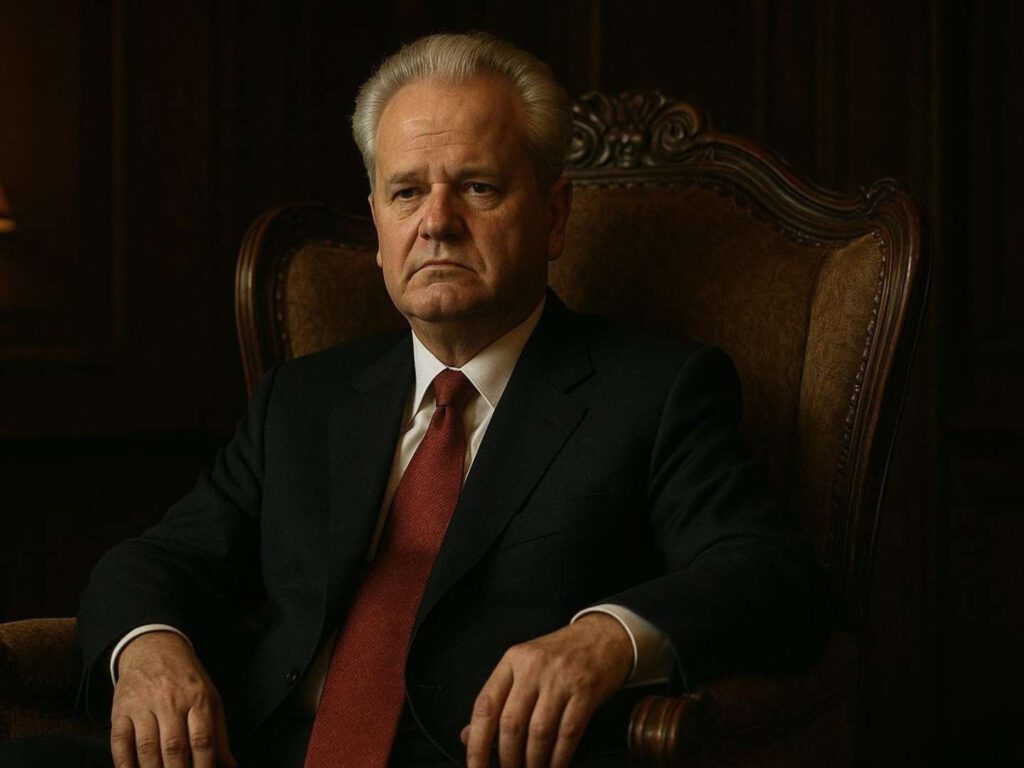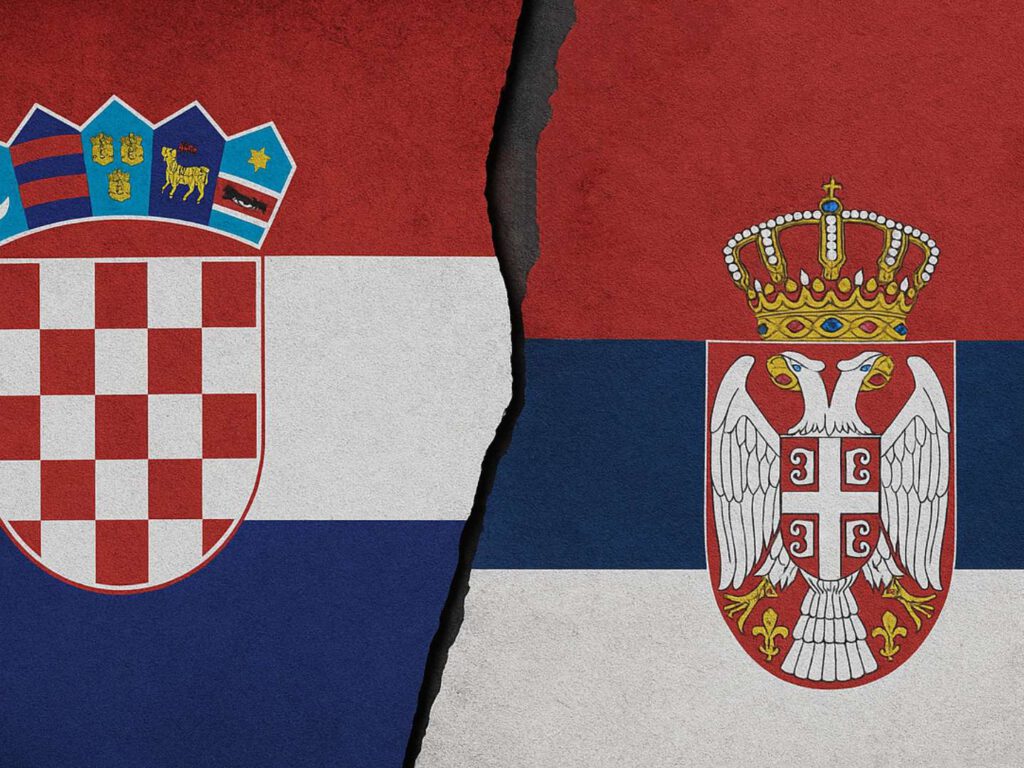An Attack on Georgia’s Democracy
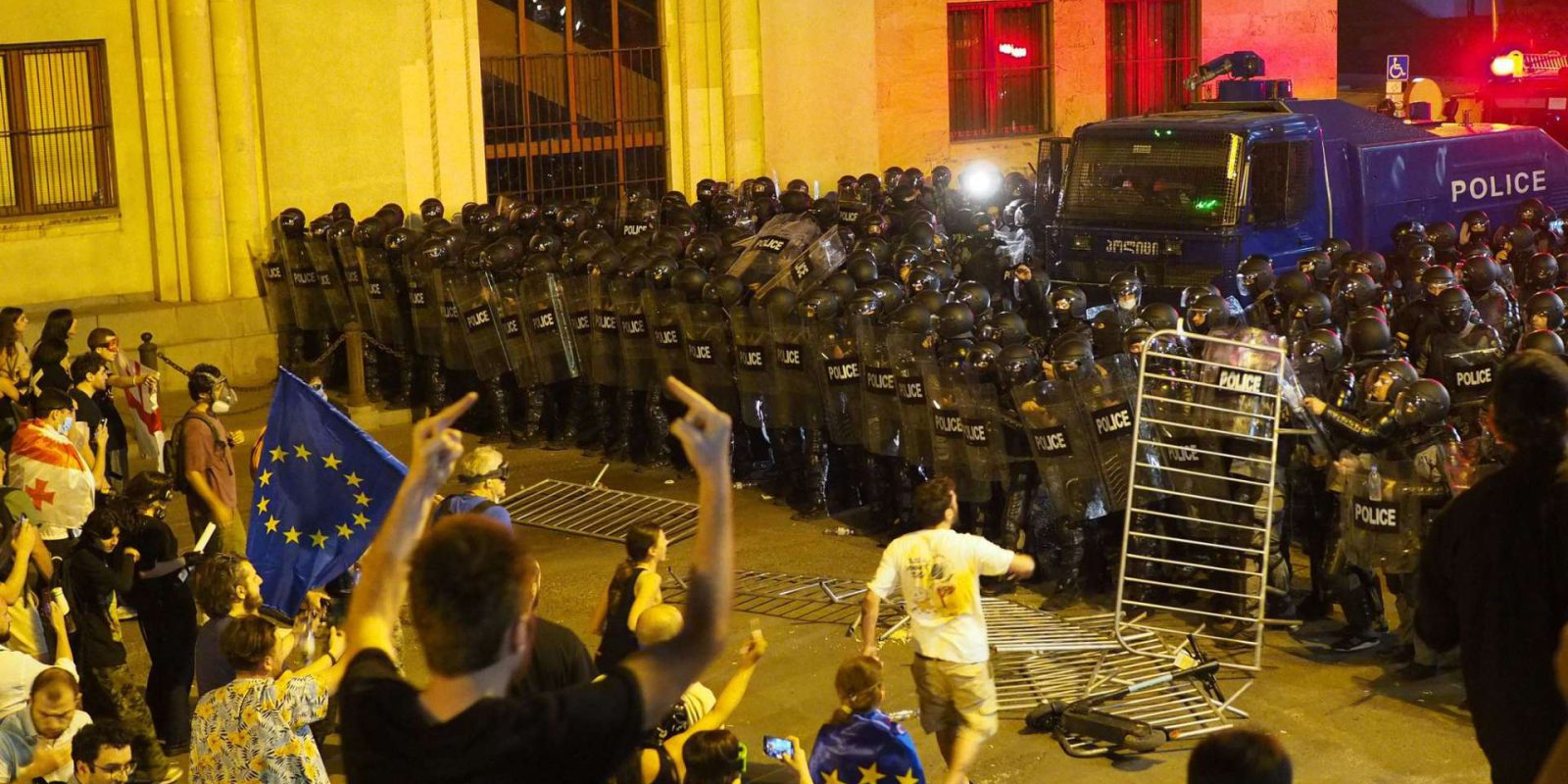
Georgia is walking on a narrow political path. On one side, there is the possibility of democratic development of the country, and on the other side, there is a real chance of establishing authoritarianism. On Monday, May 13th, at 9 am, on the third reading, the authorities adopted the law on „foreign agents“. It is directly analogous to the Russian law, which declares all non-governmental or simply foreign-funded organizations as „agents“, discredits them and restricts their activities.
On April 29, 2024, the chairman of the ruling party of Georgia, who in turn is considered the informal leader of the country, oligarch Bidzina Ivanishvili, did not hide that he, with this law, wants to destroy political opponents in the country (meaning both the non-governmental sector and political parties). In the same speech, he spoke about „conspiracies“ against Georgia by the West, the global war party and vague conservative values.
People opposed to the government and expert circles unanimously believe that Bidzina Ivanishvili’s April 29th speech officially meant a change in the geopolitical course of the country – a transition from striving towards the western democratic world to authoritarian and hostile Russia.
Why Georgia matters
Georgia is located in the South Caucasus and is a kind of connector between Europe and Asia. It is in this area that important traffic roads pass. Historically, the political importance of Georgia was determined by its geographical location, and Russia for several centuries has been trying to expand its influence towards Georgia.
In 1990, Georgia declared its independence from the Soviet Union, and after that its pro-western political course. Very soon after the Declaration of Independence, the country was engulfed first by the fire of civil war and then by ethno-conflicts. Russia secretly but openly supported separatist movements in Georgia (in Abkhazia and South Ossetia), armed and financed them – Moscow wanted to maintain its influence in „rebellious“ Georgia by occupying its territories.
In August 2008, the world saw not a hidden but a direct military aggression by Russia towards Georgia. International organizations recognized Russia as the occupier, and Abkhazia and South Ossetia as the occupied territories.
Many analysts believe that the first „rehearsal“ of the Russia-Ukraine 2022 war was organized by Russia in Georgia in 2008. Unfortunately the West soon forgot about this war, thus opening a wide door for Moscow for future expansions.
For the Georgian people integration with Western democratic states is necessary for the country’s development: institutional strengthening of democracy, social well-being and all the political and social principles that are in the European Union. There is even an entry in the constitution that obliges the government to do everything that will contribute to the country’s accession to the European Union. In 2017, Georgia received visa liberalization with the European Union, and in 2023, the candidate status. At the same time, Russia is perceived as an enemy that occupies 20 % of the country.
The broken promise of the Georgian Dream
In 2012, the Georgian Dream coalition came to power in Georgia. From year to year, the coalition disintegrated and today it is associated with the name of only one person – Bidzina Ivanishvili.
In 2022, with the start of military aggression in Ukraine by Russia, the rhetoric of the Georgian dream drastically changed – it was easy to see that the government indirectly supported Russia. Against the will of the Georgian people, Georgia did not join the sanctions against Russia, and did not impose a visa regime to them – on the contrary, government deepened political, economic and transport relations with Russia.
At the beginning of March 2023, the government party Georgian Dream (GD) initiated the „Law of Agents“, which was followed by large protests. After the unexpected backlash from the society and three days of protests and riots in the city, the government withdrew the law, under the condition that it would never be put back on the agenda. GD has neglected this promise, as many other promises during the last 12 years and reinitiated, and last Tuesday, they passed a contentious „foreign agent“ law, igniting weeks of mass street protests.
In April 2024, the GD, with a slightly changed face, initiated the „Agents Law“ again. They cited the need for vague „transparency“ as an argument, that there is supposedly a similar law in America and European countries. The law was followed by an unprecedent domestic and foreign response in the history of Georgia. The European Union and individual countries within it unanimously called on the Georgian authorities to withdraw the law that contradicts European values and excludes the country’s European integration – political and economic sanctions against the Georgian Dream are already being considered (by both the EU and the United States of America).
The Agents Law
There is no exact answer to the question of what prompted the authorities to initiate the highly controversial law as the „Agents Law“. A large part of society believes that it was Bidzina Ivanishvili’s individual decision, which in turn is governed from Moscow. Be that as it may, in October 2024, elections are planned in Georgia, and it can be said that whether this law will be implemented or not, the fate of the country’s future will be decided in October.
Through the law, you will be able to put pressure on political parties on the one hand and discredit and destroy the non-governmental sector on the other hand. As already mentioned above, Georgia is walking on a narrow path – on one side, the country’s democratic development which is supported by the Georgian People, or the country can sink into Russian authoritarianism for years or decades.
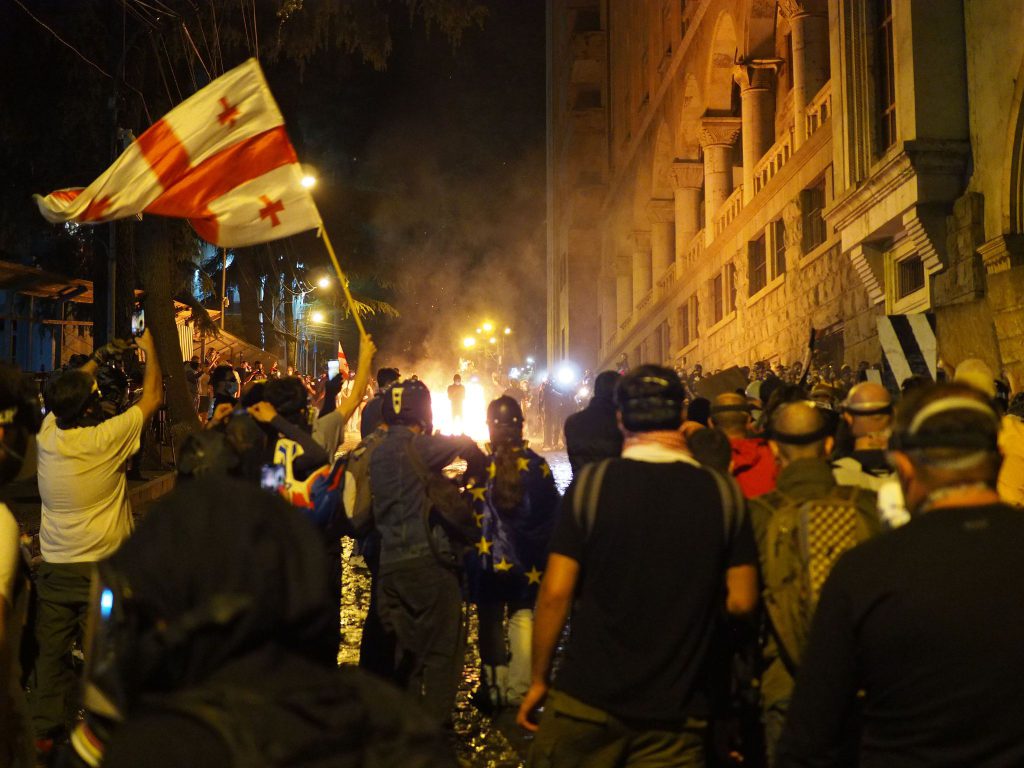
In parallel with the law, the Parliament of Georgia adopted the so-called „Offshore“ law, according to which you can move property into the country without any taxes. It is not difficult to understand that Bidzina Ivanishvili is interested in the adoption of this law, who is trying to avoid the impact of sanctions. On the other hand, Georgia is becoming a repository for „black money“.
Parallel to all this, mass protest demonstrations have been going on continuously for three weeks in Tbilisi, especially young people are active. At the rally on April 28th, a record number of people in the history of Georgia, up to 110,000, came out. The government tried to suppress the protest through violence, but it did not work.
Protests erupt due to „Russian Law“
It’s been already a month since hundreds of thousands of people blocked the main streets of the capital Tbilisi, despite the weather conditions and the brutality of the police using tear gas, pepper sprays, rubber bullets and water cannon tracks. One protester says she has never seen the police being so brutal and detaining people for nothing. „My mom recalled the 9th of April, the day when soviet troops entered Tbilisi and brutally clashed a demonstration for its independence from the USSR. Our government is dragging us back to what we have escaped – illiteracy, propaganda, isolation, inequality. We, the Georgians, do not want to go back to our past“, says M. Lashkhi, a student of Tbilisi State University, which boycott over foreign agent law. More and more universities and students are joining this academic boycott around the country.
Since the first initiation of this law, the government’s representatives and primarily, the prime minister of Georgia Irakli Kobakhidze in a meeting with media and civil society representatives mentioned many times, that this law is not „the russian law„, while all the sections of it intersect. He expressed the urge need for transparency and foreign influences in NGO, civil society, and media sectors. These sectors refuse to call themselves „foreign agents“. „More than 400 civil society organisations call on the government to withdraw the law from the parliamentary discussions“ was written on Civil.ge.
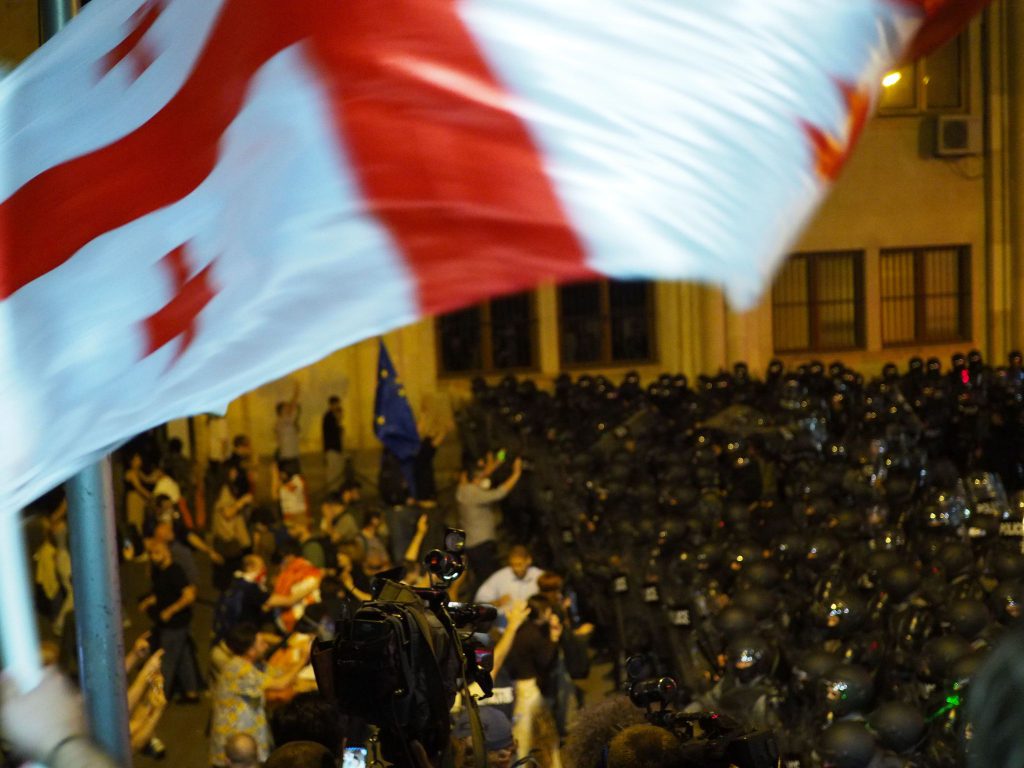
Opponents of this law are exactly these people – the ones who are not dependent on the government and are in control of their income, which mostly comes from the EU, US or other sources. Besides, this is one of the most powerful pillars of nowadays Georgian democracy, independent and critical media, NGOs and CSOs, because these are exactly those who criticize and challenge the authorities. However, according to the law adopted in the third reading, it is obvious that it is going to penetrate not only organizations, but people’s lives too:
- The Ministry of Justice will have the right to request not only all types of personal data, but also confidential information;
- The Ministry of Justice will have the right to fine all persons (individuals) with 5,000 GEL for not submitting the requested information (once again – including secret information) etc.
The passing of the „foreign agent“ law in Georgia’s parliament has not only deepened political division, but has also galvanized significant opposition and mistrust from the public, leading to continued mass street protests. The outcome of this legislative move is clear: more control over the people, of a critical and independent thinking and expression, that can be followed by the isolation of Georgia from the West. But, as one of the protesters said:
„We will not sacrifice ourselves to our country, but we will build a better one.“
GABRIEL CHUBINIDZE is a graduate of the BA in Sociology, and MA in Modern history of Georgia at the Ilia State University in Tbilisi, Georgia. He is a MA program coordinator now. Gabriel is a conflict and modern history researcher, photographer, who is particularly invested in the history of USSR, post-soviet Georgia, conflict transformation and peacebuilding, spaces and places. The themes of soviet legacies, architecture, displacement and understandings of it is central in Gabriel’s work.
LELA JOBAVA graduated from Caucasus University with a degree in European Studies. She is a conflict researcher and a journalist from Gali, Abkhazia. Driven by her passion for conflict-driven reporting, storytelling, and filmmaking, Lela is committed to covering diverse ethnic, religious, linguistic, and gender-related topics, and crafting distinctive stories that highlight unique perspectives. Lela is particularly invested in providing coverage of current affairs and uncovering the untold stories of the unhurried pace of life in Abkhazia, which has remained concealed under the veil of globalization. The themes of memory and identity are integral elements in her work.



